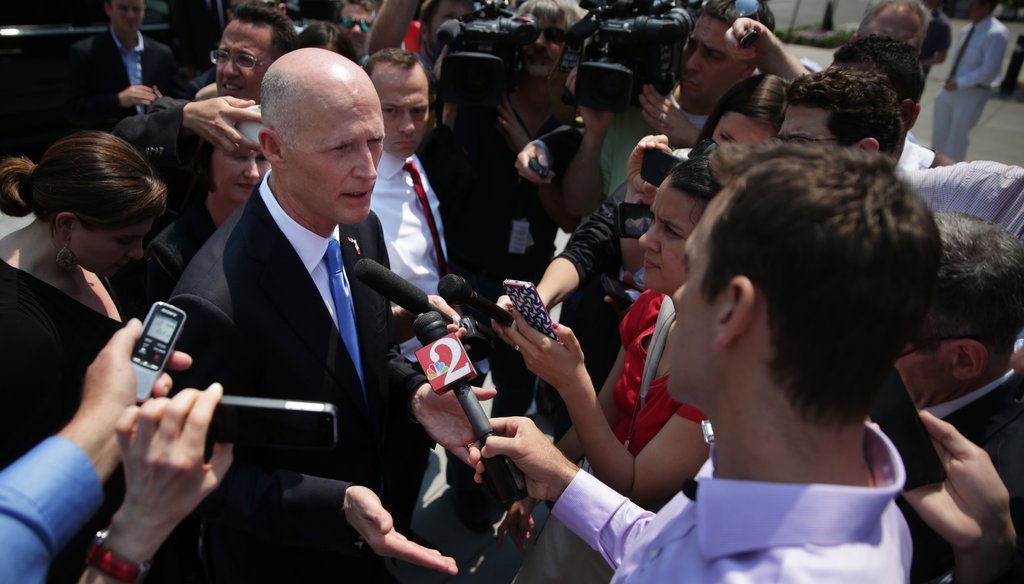Stand up for the facts!
Our only agenda is to publish the truth so you can be an informed participant in democracy.
We need your help.
I would like to contribute

Gov. Rick Scott speaks with reporters in Washington, D.C., after meeting with U.S. Health and Human Services Secretary Sylvia Burwell on May 6, 2015. (Getty Images)
Editor’s note: Gov. Rick Scott traveled to Washington on May 6, 2015, and met with Sylvia Burwell, secretary of the U.S. Department of Health and Human Services. What follows is an annotated transcript of his comments to reporters after the meeting.
Scott: "First off, let me introduce Cynthia Kelly, my budget director. I had the opportunity to meet with Secretary Burwell. First thing I want to do is I want to thank her and her team for the opportunity to meet with them. I came up here to ask them to reconsider their decision on LIP. HHS knew our timeline during session, so we finished the regular session without a budget. We need to get a budget done by the end of June. We filed our application to continue the LIP program and so I’ve let them know that -- our timeline, and we need an answer right now.
"As we all know, a lot of things in life, not getting an answer’s the same as getting a no. This is important to our families in Florida. Let’s remember, this is a federal program for low-income families, low-income families depend on this program. This program shouldn’t be going away. And again, the federal government shouldn’t be trying to coerce us to expand Obamacare with an existing program that they started and they should continue to fund. So Cynthia and I will be glad to answer any questions."
Reporter: "So what did she tell you?"
Scott: "What we talked about today was, you know, what our needs were, from a time frame standpoint. We went through, now we’re going to have to have a special session, how long it’s going to take. And what my goal today was, step one, ask them to reconsider where they are now, because no action is the same as a no. And then two, if they are going to take action, they need to take action in the next few weeks, because if they don’t, again, that’s the same as a no, so we had a good conversation, I want to thank her again for the opportunity, but we don’t have a resolution."
Sign up for PolitiFact texts
Reporter: "So, your health agency filed its formal proposal about two weeks ago on April 20. If you all need a resolution so soon, can you say why it took that long to submit something?"
Scott: "Yeah, sure. Historically in this what you did was, AHCA would work with HHS to come up with a program that everybody was comfortable with and then you would make your filing. So, we were not getting an answer from HHS so we went ahead and made the filing now to try to see if we could get an answer in a timeframe that worked for our state budget. Again, our state budget has to be done by the end of June. HHS knew that our special session ended last Friday and there was no action."
Reporter: "Did you discuss the possibility of expanding Medicaid? She try to persuade you at all?"
Scott: "Well, what I came up here to talk about was the LIP program. What I came up to talk about was the LIP program."
Reporter: "Governor, your opponents have accused you of grandstanding as opposed to trying to find a solution for health care funding. How do you respond to that criticism?"
Scott: "Well, I worked this entire session to try to come up with a resolution. As you know, my background is, I’ve worked with HHS in my prior career, and this is something that we were told by, the hospital industry told us back in February, they thought the program was going forward. Our conversations through AHCA with HHS, thought it was going forward. We were surprised when the Senate wasn’t comfortable doing a budget until we got an answer on LIP. That’s why we worked hard, we made our filings, we kept conversations going to try to get this done. But now we’re in a time crunch. If we don’t have an answer, then our only solution is a base budget. That’s what I’m working on now, is to make sure that we keep government working. But let’s remember, this started with a federal government program for low-income families. Low-income families deserve to have an answer. Low-income families don’t have a timeline that fits with a federal timeline, they need to have an answer now, they know, everybody knows (what) this program with the timeline for it was, and HHS should give us an answer now."
Reporter: "But governor, HHS officials tell us if you would take the Medicaid funding, there’d be no need for this LIP program. What do you say to that?"
Scott: "Let’s remember, the families that are covered through the Low Income Pool is a different group of individuals than are covered by Obamacare. All right? So, this is a federal program, all right, that they should continue. We also know in NFIB vs. Sebelius that the Supreme Court said it’s illegal to be coercing a state to expand Obamacare. And that’s exactly, when they say that, that’s exactly what they’re doing."
Reporter: "Isn’t that money, though, there for the taking, if you just take it?"
Scott: "Well, let’s remember, there’s nothing for free out of the government, all right? And let’s remember this on LIP: Have your taxes gone down? No. So we’re still paying our taxes. But the expansion of Obamacare is not free. It’s anticipated to cost $5 billion for Florida taxpayers over the next 10 years. And also let’s look at history. There’s almost no government health care program that has actually cost less over time than what they anticipated in the beginning. And let’s look at Obamacare. Has it caused health care costs to go up? Yes. Has it made it more difficult for businesses to compete globally? Yes. So it’s not been helpful to our citizens."
Reporter: "Will you call a special session if there’s no obvious agreement between the House and Senate?"
Scott: "Well, I’m going to make sure that we get a budget done, I’m going to do everything I can to make sure we get a budget done by the end of June. I’m looking at my options right now, and we’re working on a base budget."
Reporter: "What’s a base budget?"
Scott: "We’re just going to have base funding to keep government going, make sure we have all the critical services. That’s what our citizens deserve in our state."
Reporter: "Why are you concerned about the possibility of the federal government taking away federal matching for the expansion population? You mentioned this idea of, they could do this to LIP if they would do that to Medicaid expansion, but there’s no precedent of them taking away total federal match for a population."
Scott: "So the same federal government that’s walking away from a program, they’ll never walk away from another program? Would you do business with somebody like that? No, you wouldn’t. So how can they be walking away from this group of low-income families, to say we’re going to take care of this group of low-income families, but trust us that we’ll never change our mind. I mean, you know, you would never do business with someone like that."
Reporter: "Governor, you’ve changed your mind on this very issue. Can you explain that to people? Why have you gone from a yes on expansion to a no?"
Scott: "I’ve been very consistent. I said this from the beginning. If the federal government wants to have a program that they pay for, I won’t stand in their way. But when they want me to tax our citizens for a program . … It’s the same as high-speed rail. In high-speed rail, I said, I told the federal government then, if you want to do a project in our state, and you want to fund a project in our state, and you want to be responsible for a project in our state, then you go do it. But don’t come and tell me you want to do something in my state and have me raise the taxes on my citizens. So it’s $5 billion to our citizens. And let’s look at a little history for a second. When I walked into this job four years ago, Medicaid had been growing at three and a half times their general revenue. It was sucking out all the money in the budget, couldn’t put money into education, we had a $4 billion deficit. We get historic Medicaid reform and now we have a program that works. We know what’s going to cost us, we have insurance companies responsible for the care of our Medicaid recipients. Our Medicaid recipients know who is responsible for their care. We have a program that’s working in our state. And let’s look, people are moving to our state, 250,000 people moved to our state last year. We’re bigger than New York now, and we have a budget surplus (of) $1.8 billion."
Reporter: "What’s the message to the people who would get helped on Medicaid expansion? The 800,000. What’s your message to them, they’d say they could get help, what do you tell them?"
Scott: "What I tell people is that I’m going to do everything I can to make sure that we have affordable health care, that people have good access to health care, that they’re going to get good outcomes for health care, but what I’m not going to do is put our state in a position that I have to raise somebody’s taxes because the federal government has a program that they won’t work with the state on. Have a good day. Bye bye."
Our Sources
PolitiFact Florida






















